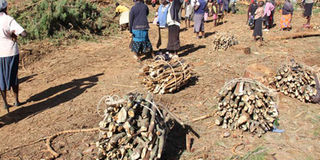We will pay dearly for destroying forests

Women fetch firewood from Sabor Forest in Elgeyo-Marakwet County. Governor Alex Tolgos banned logging in the county in 2013, saying area residents were not profiting. PHOTO | JARED NYATAYA | NATION MEDIA GROUP
What you need to know:
- The poor are always the first to suffer from climate change because the fragile earth and the fragile of the earth are sisters.
- The casual response to the crisis does not augur well, typified by Nema busybodies chasing plastic bags in public transport.
Waking up is never a pleasant experience, especially when confronted with reality and forced to leave the comfort of make-believe dreams.
For decades, Kenyans have ignored the pillage and destruction of the environment.
We slept as loggers, sand harvesters, charcoal tycoons, poachers and politicians raped the country and we pretended that it didn’t matter or that nature would renew itself.
ENVIRONMENT
We were wrong. So wrong. God and your neighbour may forgive but Mother Nature does not forgive as Pope Francis reminds us.
Now we face an ecological and environmental crisis of catastrophic proportions.
The Red Cross as usual was the first to warn that 3.4 million Kenyans are in need of food assistance in 2018, and that includes areas of western Kenya and Nyanza that have never known drought before but now their rivers are drying up.
Governor Charity Ngilu then blew the whistle on the charcoal barons who are making a desert of Kitui County.
MAU FOREST
The recently appointed Environment Cabinet Secretary Keriako Tobiko joined the clamour when he put a three-month ban on logging and established a task force to investigate the state of the country’s forests.
Kenya claims to have a forest cover of seven per cent compared to the global minimum standard of 10 per cent. Yet, one suspects that this meagre figure may be inflated to protect the looters and loggers within the realms of government.
Ten years ago, William Ruto and Isaac Ruto blocked every initiative of then Prime Minister Raila Odinga to protect Mau Forest.
The DP’s crocodile tears will not now produce rain as that and other forests have been decimated.
The Pontiff said last month in Chile that deforestation is a sin and that cowardice in defending nature is a grave sin. Between 1990 and 2005, Kenya lost five per cent of its forest cover or 186,000 hectares despite the heroic efforts of Prof Wangari Maathai.
ETHNIC STRIFE
An exploding population, desertification, climate change, drought and ethnic conflict as a political by-product is a dangerous combination unless the government responds urgently and effectively. We are all too aware of the war in Syria but most fail to note that the trigger was the five-year drought between 2006 and 2011 that drove a million farmers off the land and into urban settlements.
Failure by Hafez al-Assad’s government to address their plight led to outrage as the population were starving for jobs and food. The resistance that emerged was a revolution of the hungry.
REVOLUTION
In 2011, the Egyptian protests against President Hosni Mubarak began with the chant, ‘bread, freedom, dignity’.
The poor are always the first to suffer from climate change because the fragile earth and the fragile of the earth are sisters. The subsidised flour may have been an election gimmick but will the poor afford food this year?
Declaring drought a national disaster is not enough.
Millions of young, jobless and hungry youth have the potential and access to social media to rage against this government if a structured plan to address climate change and environmental degradation is not put in place.
The casual response to the crisis does not augur well, typified by Nema busybodies chasing plastic bags in public transport. The revolt of the hungry is not far away.
Father Dolan is a Catholic priest based in Mombasa. [email protected] @GabrielDolan1





